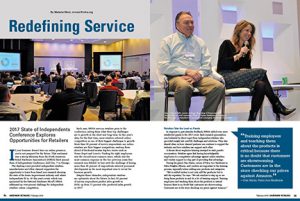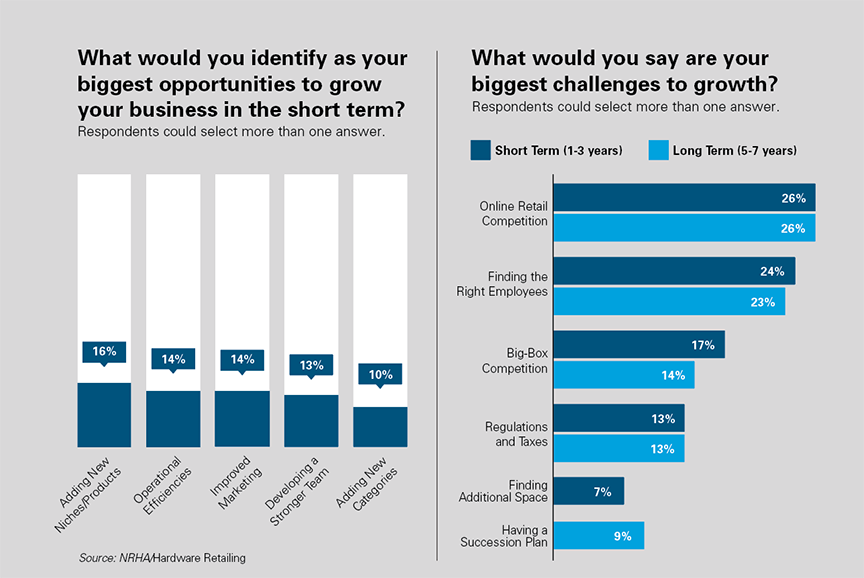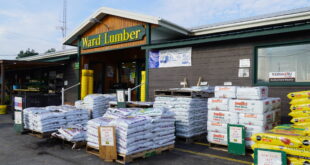
Click the image above to view a full PDF.
Redefining Service
If your business doesn’t have an online presence, you’re not prepared for the future. That sentiment was a strong takeaway from the North American Retail Hardware Association’s (NRHA) third annual State of Independents Conference, held Dec. 7 in Chicago.
The daylong event provided independent retailers, manufacturers and other channel supporters the opportunity to learn from brand new research showing the state of the home improvement industry and where independents fit in. At this year’s event, which was sponsored by the National Hardware Show®, NRHA addressed an ever-present challenge for independent retailers: online competition.
Each year, NRHA surveys retailers prior to the conference, asking them what their top challenges are to growth in the short and long term. In this year’s data, for the first time, most retailers selected online competition as one of their biggest challenges to growth. More than 30 percent of survey respondents say online retailers are their biggest competitors, ranking them ahead of brick-and-mortar big-box stores such as Home Depot and Lowe’s. Finding the right employees was the second-most common issue, which was the most common response in the two previous years this research was fielded. In line with the challenge of hiring, more than 36 percent of respondents selected personnel development as the most important area to invest for business growth.
Despite these obstacles, independent retailers are optimistic about the future. In fact, 81 percent of survey respondents predict sales growth in 2018, up from 72 percent who predicted sales growth in 2017.

Retailers Take the Lead on Panels
In response to past attendee feedback, NRHA added even more retailer-led panels to the 2017 event. Each research presentation was bolstered by direct input from independent retailers who provided insight into real-life challenges and solutions. They also shared ideas on how channel partners can continue to support the industry and how retailers can support each other.
A theme about employee training emerged in each panel’s conversation. Retailers agree that having knowledgeable employees is a competitive advantage against online retailers, and vendor support is a big part of providing that advantage.
During his panel, Dan Harris, owner of Palos Ace Hardware in Palos Heights, Illinois, said vendors are important to the training process, especially when adding new products and categories.
“We’ve added niches to not only add the products, but to add the expertise,” he says. “We ask vendors to step up as we bring those products in and do a lot of training support.
“Training employees and teaching them about the products is critical because there is no doubt that customers are showrooming. Customers are in the store checking our prices against Amazon.”
Center Hardware & Supply Co. chief operating officer Jamie Gentner of San Francisco agrees that vendors round out the training process and help employees pass along their knowledge to customers.
“Product knowledge is huge, and some of the training always has to be hands-on,” she told the audience. “It’s critical to have someone in the territory to represent that brand.”
Working with vendors builds employees’ confidence with products, which leads to stronger sales, says panelist Megan Menzer, owner of Newton’s True Value in southeast Kansas.
“Training is key for us. We’re always looking for vendors to work with us on training, because the more comfortable employees are with a product, the easier it is to sell,” she says.
In addition to vendor training, NRHA’s training programs are also a valuable resource for creating knowledgeable employees, says panelist Greg Schlect, owner of Greg’s True Value in St. Francis, Wisconsin. Schlect’s employees follow an outline of NRHA online training programs to get them up to speed on product knowledge.

Once employees are trained, retaining the strong employees is also a challenge for independent retailers. Jake Smith, owner of Jared’s Ace Hardware in Bishopville, South Carolina, told attendees that he keeps a checklist of employee tasks and offers incentives for performance, which has helped improve employee productivity at his business.
“We’re monitoring certain tasks employees are expected to complete, and we’re monitoring how well they finish them,” Smith says. “At the end of the quarter, those above expectations receive gift cards, but those who don’t meet expectations aren’t eligible for sales bonuses.”
Panelist Jeremy Melnick, who owns and operates eight Gordon’s Ace Hardware stores in the Chicago area, says he understands that employees may not make their careers at his business, but he wants them to see Gordon’s as a strong steppingstone to build their employment history.
“When we recruit people, we say, ‘Use us as a resume builder. You work hard here and look for your next job. You’re either going to move up or move out.’ Hopefully that strategy gets us people who are energetic,” he says. “That culture is slowly making an impact for us.”
More Than Convenience
While customer service has been the rallying cry among independent retailers as their key to competing against online retailers, it’s quickly becoming apparent that the way brick-and-mortar retailers define service is evolving.
“The old concept of customer service has changed,” Dan Tratensek, executive vice president of NRHA and publisher of Hardware Retailing, told the audience. “With Amazon offering one-hour delivery in some areas and its ease of returns, convenience as service can’t be what independent retailers rest their brands on anymore.”
Jim Robisch, a senior partner at Indianapolis-based research firm The Farnsworth Group, which conducted consumer research as part of a joint project with NRHA that was presented at the conference, agrees. He says when a retailer doesn’t have a product available in store, customers are rarely going to wait for the next shipment.
“When you miss out on a sale opportunity in your stores, customers don’t often say, ‘Oh, I’ll come back for it later,’” he told attendees.
The retailers who participated in the panels all shared ways that they differentiate their businesses and are rethinking what service means to consumers who are now conditioned to receiving online orders quickly.
In his panel, David Dishke, owner of Grand River Home Hardware and Grimsby Home Hardware in Ontario, said the policy at his business is to address out-of-stock merchandise in the moment and to discount it so customers are less inclined to go online.
“If we don’t have something in the store, we offer 10 percent off because it’s not in stock, and we’ll order it to arrive in the next shipment,” he says.
Melnick says his operation has focused on fast delivery, which is competitive in Chicago.
“We can get product in our stores and delivered within 24 hours,” he says. “We promote the fact that if we don’t have it, we can get it for you.”

Meeting Customer Expectations Online
According to research conducted by NRHA and The Farnsworth Group, 95 percent of independent retailers have a website, and retailers are fairly tuned in to what their customers ask of their online presence. Consumers surveyed say they are most often researching prices, looking for product reviews and seeking out promotional offers when they visit a home improvement retailer’s website. Retailer survey respondents recognized the value of this information, but they rated “the ability to get basic information about my business” as the most important feature of their website, which wasn’t something consumers rated as a high priority. This disconnect is likely because consumers expect basic information—store location, hours and contact information—to be readily available, and it’s not the primary reason they are visiting home improvement retailers’ websites.
A panel of retailers who are developing their businesses’ online strategies talked about how vital it is for independents to figure out a way to develop an online presence.
“Amazon is changing the experience for the customer, and if we don’t change how we interact with our people, we will lose,” Steve Fusek, owner of Fusek’s True Value Hardware in downtown Indianapolis, said during his panel. “We need to figure out how to compete against Amazon and the expectations they’re creating.”
At his brick-and-mortar location, Fusek is experimenting with geolocation, through which he is targeting ads and specials to customers when they are within a certain radius of his store. He also uses the technology to offer a pickup service so customers don’t need to get out of their cars to collect online orders. When their phone approaches the business, employees inside get an alert and are able to meet the customer with their purchases.
“Technology is the future. There’s not enough urgency in our industry,” Fusek told attendees.
At Buchheit, which has eight locations in Missouri, the solutions to addressing customer and employee needs required them to build their own platform, including training tools.

“We identified painful processes in our stores and weeded them out using technology,” panelist Jared Hotop, vice president of IT at Buchheit, says. “We changed a 55-step special-order process into a three- or four-step module.”
Jake Wilson at Wilco, which has 18 locations in Washington state and Oregon, says e-commerce companies are equally as capable of forming relationships with consumers as are brick-and-mortar retailers, so it’s not as easy for independents to assume they have the edge in that area.
“We’re trying to focus on solving customer problems with buy online, pickup in store services,” he told the audience.
“E-commerce is so technically challenging that it’s easy to lose sight of the customer. We have that focus in our stores, so we need to figure out how to do it online, because others are.”
Although building an online presence and using technology to better understand consumers is challenging and expensive, Robisch says there aren’t any alternatives for retailers who want to compete.
“Find the time, find the talent and find the money. Figure it out. Are you going to be left out?” he told attendees.

The Social Connection
Tratensek says retailers who are finding success with technology have already developed their brands for social media, and it’s easy to connect the social media experience with the in-store experience because independent retailers already know their audience.
“Social media dovetails so well with the in-store experience and the individualized brand building within a market,” he says. “Independent retailers can have a leg up because they know their communities and what resonates with their immediate markets.”
The event culminated with a look at the future of retailing and a panel of the next generation of independent retailers. The panelists expressed similar concerns about the industry, including employee training and retention and competing as small businesses in today’s retail climate.
As young retailers, however, they are optimistic about future opportunities in the industry. The panelists agree that while the definition of customer service is changing, it’s important to remember your roots as a small business.
“As much as we preach that customer service is the most important thing out there, for small businesses, it’s different, because a bad experience can change a customer’s opinion for a long time,” says panelist Adam Barden, owner of two Vassar True Value Hardware locations in Michigan. “There’s something about that customer experience, that if you disappoint them, it takes a more emotional toll on them than if they have the same experience at a big-box store.”
Panelist Scott Jerousek, CEO of Family, Farm & Home in Ohio, says that the next generation of consumers—millennials and Gen Zers—are helping to reenergize the appeal of independent businesses, which is something independent home improvement retailers should capitalize on.
“Small business right now is really cool, and millennials want to take ownership of the local businesses in their towns,” he says. “We need to get our customers to take ownership of our locations and gain their trust. It’s a good time to be a small business.”
 Hardware Retailing The Industry's Source for Insights and Information
Hardware Retailing The Industry's Source for Insights and Information








